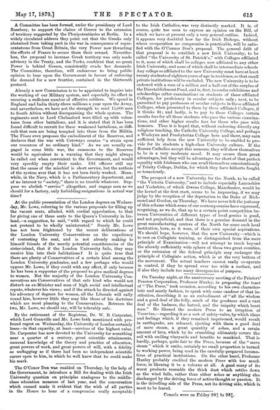On Tuesday night, at the anniversary meeting of the Printers'
Pension Corporation, Professor Huxley, in proposing the toast of "The Press," took occasion, according to his own character- istic and manly fashion, to speak with some candour of that in- stitution, describing it as an embodiment of "all the wisdom and a good deal of the folly, much of the goodness and a vast deal of the badness, the hatred, and the iniquity which beset man." He likened the modern Press to an irruption of Vesuvius,—regarding it as a sort of safety-valve, by which ideas and feelings which, if they remained imprisoned, would result in earthquake, are released, ejecting with them a good deal of mere steam, a great quantity of ashes, and a oerain amount of lava, which by its crumbling ultimately covers the soil with smiling vineyards and benefits to manic-hid. That is hardly, perhaps, quite fair to the Press, became of the "mere steam" which it emits, certainly no small proportion is turned to working power, being used in the carefully-prepared locomo- tives of practical institutions. On the other hand, Professor Huxley probably credited the modern Press with too raueh force, in likening it to a volcano at all. A good many of its worst products resemble the thick dust which settles down as the wind falls, rather than either ashes or anything else discharged by the driving force of active thought or passion. It is the drivelling side of the Press, not its driving side, which ia most to he feared.


































 Previous page
Previous page